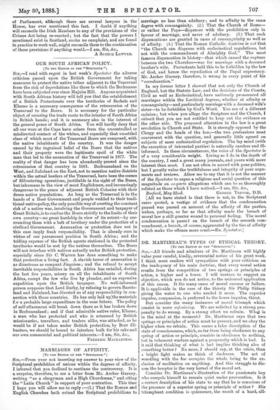OUR SOUTH AFRICAN POLICY.
LTO THE EDITOR OF THE " SPECTATOR "I
Six, I read with regret in last week's Spectator the adverse -criticism passed upon the British Government for taking measures to protect the native tribes adjacent to the Transvaal from the risk of depredations like those to which the Bechuanas have been subjected ever since Majuba Hill. Anyone acquainted with South African history will tell you that the establishment of a British Protectorate over the territories of Sechele and Khame is a necessary consequence of the retrocession of the Transvaal to the Boers. It is necessary for the particular object of securing the trade route to the interior of South Africa in British hands ; and it is necessary also in the interest of the general peace of South Africa. You will hardly deny that all our wars at the Cape have arisen from the uncontrolled or misdirected contact of the whites, and especially that unsettled class of which most of the Transvaal Boers are composed, with the native inhabitants of the country. It was the danger -caused by the ingrained belief of the Boers that the natives and their property were the legitimate spoil of the white man that led to the annexation of the Transvaal in 1677. The reality of that danger has been abundantly proved since the retrocession of that country in 1881. Bechuanaland. on the West, and Zululand on the East, not to mention native districts within the actual borders of the Transvaal, have been the scenes of filibustering operations, justifiable in the sight of the Boers, but inhumane in the view of most Englishmen, and increasingly -dangerous to the peace of adjacent British Colonies with their dense native populations. As long as the Transvaal is in the hands of a Boer Government and people wedded to their traditional nativepolicy, the only possible way of averting the constant risk of a native war, involving the Government and taxpayer of Great Britain, is to confine the Boers strictly to the limits of their own country—no great hardship in view of its extent—by surrounding them with a belt of territory under the protection of a -civilised Government. Annexation or protection does not in this case imply fresh responsibility. That is already ours in -virtue of our paramount position in South Africa; and the trifling expense of the British agents stationed in the protected -territories would be met by the natives themselves. The Boers will not interfere with natives actually under British protection, -especially since Sir C. Warren has done something to make that protection a living fact. A slavish terror of annexation is as disastrous as rampant Jingoism ; and the refusal to accept inevitable responsibilities in South Africa has entailed, during the last five years, misery on all the inhabitants of South Africa, except the few who live by plunder, and an expensive -expedition upon the British taxpayer. No well-informed person supposes that Lord Derby, by refusing to govern Basutoland and Zululand, has divested us of any responsibility in connection with those countries. He has only laid up:the materials far a probable large expenditure in the near future. The policy of self-effacement will break down there as it has broken down in Bechuanaland ; and if that admirable native ruler, Khame, a man who has protected and who is esteemed by British missionaries, travellers, and traders alike, was attacked, as he would be if not taken under British protection, by Boer filibusters, we should be bound to interfere both for his sake and our own commercial and political interests.—I am, Sir, &c.,
FREDERIC MACKARNESS.














































 Previous page
Previous page